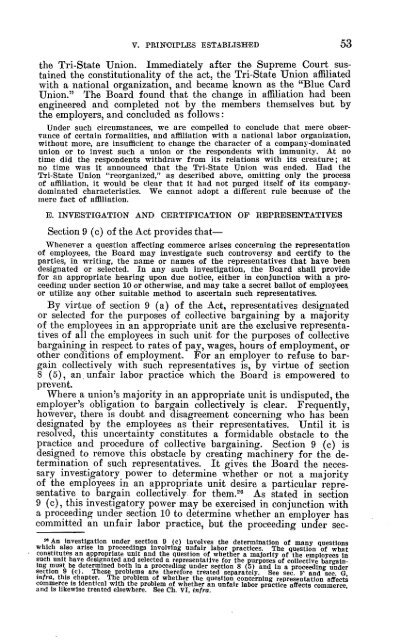NATIONAL LAB RELATIONS BOARD - National Labor Relations ...
NATIONAL LAB RELATIONS BOARD - National Labor Relations ...
NATIONAL LAB RELATIONS BOARD - National Labor Relations ...
You also want an ePaper? Increase the reach of your titles
YUMPU automatically turns print PDFs into web optimized ePapers that Google loves.
V. PRINCIPLES ESTABLISHED 53the Tri-State Union. Immediately after the Supreme Court sustainedthe constitutionality of the act, the Tri-State Union affiliatedwith a national organization, and became known as the "Blue CardUnion." The Board found that the change in affiliation had beenengineered and completed not by the members themselves but bythe employers, and concluded as follows:Under such circumstances, we are compelled to conclude that mere observanceof certain formalities, and affiliation with a national labor organization,without more, are insufficient to change the character of a company-dominatedunion or to invest such a union or the respondents with immunity. At notime did the respondents withdraw from its relations with its creature; atno time was it announced that the Tri-State Union was ended. Had theTri-State Union "reorganized," as described above, omitting only the processof affiliation, it would be clear that it had not purged itself of its companydominatedcharacteristics. We cannot adopt a different rule because of themere fact of affiliation.E. INVESTIGATION AND CERTIFICATION OF REPRESENTATIVESSection 9 (c) of the Act provides that—Whenever a question affecting commerce arises concerning the representationof employees, the Board may investigate such controversy and certify to theparties, in writing, the name or names of the representatives that have beendesignated or selected. In any such investigation, the Board shall providefor an appropriate hearing upon due notice, either in conjunction with a proceedingunder section 10 or otherwise, and may take a secret ballot of employeesor utilize any other suitable method to ascertain such representatives.By virtue of section 9 (a) of the Act, representatives designatedor selected for the purposes of collective bargaining by a majorityof the employees in an appropriate unit are the exclusive representativesof all the employees in such unit for the purposes of collectivebargaining in respect to rates of pay, wages, hours of employment, orother conditions of employment. For an employer to refuse to bargaincollectively with such representatives is, by virtue of section8 (5), an unfair • labor practice which the Board is empowered toprevent.Where a union's majority in an appropriate unit is undisputed, theemployer's obligation to bargain collectively is clear. Frequently,however, there is doubt and disagreement concerning who has beendesignated by the employees as their representatives. Until it isresolved, this uncertainty constitutes a formidable obstacle to thepractice and procedure of collective bargaining. Section 9 (c) isdesigned to remove this obstacle by creating machinery for the determinationof such representatives. It gives the Board the necessaryinvestigatory power to determine whether or not a majorityof the employees in an appropriate unit desire a particular representativeto bargain collectively, for them. 2° As stated in section9 (c), this investigatory power may be exercised in conjunction witha proceeding under section 10 to determine whether an employer hascommitted an unfair labor practice, but the proceeding under sec-An investigation under section 9 (c) involves the determination of many questionswhich also arise in proceedings involving unfair labor practices. The question of whatconstitutes an appropriate unit and the question of whether a majority of the employees insuch unit have designated and selected a representative for the purposes of collective bargainingmust be determined both in a proceeding under section 8 (5) and in a proceeding undersection 9 (c). These problems are therefore treated separately. See sec. F and sec. G,infra, this chapter. The problem of whether the question concerning representation affectscommerce is identical with the problem of whether an unfair labor practice affects commerce,and is likewise treated elsewhere. See Ch. VI, infra.
















